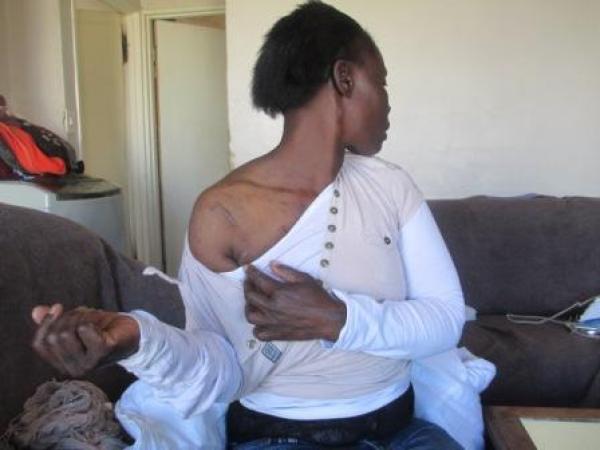Asylum seeker claims intimidation

A Zimbabwean woman, Faith Muchina (not her real name), 48, claims that officials at the Cape Town Department of Home Affairs (DHA) intimidated her into changing her application for refugee status to cite economic and not political reasons. As a result she lost her asylum seekers status in October 2012 and is now illegally in the country. She has now been in the country for eight years.
Muchina says in Zimbabwe she was continuously harassed from 2002 to 2005 by ZANU-PF supporters and war veterans. In 2003, she was at home with her 17-year-old son when she was attacked. Her tuck shop was looted. Her son was badly injured; she was stabbed on the shoulder by one of 38 men that attacked her. Vomiting blood she crawled to the Zimbabwe Republic Police (ZRP) who called an ambulance, but refused to open a case against the ZANU-PF supporters.
Such incidents forced her to seek refugee status in South Africa. In October 2005 she applied for political asylum. At the time many Zimbabweans who came to South Africa for economic reasons also applied for political asylum. Muchina says officials, who were handing out application forms, advised all Zimbabweans not to write anything political because they said there was no war in Zimbabwe. Genuine political applicants who had written political statements on their forms were given new application forms to re-do them. Muchina says she accordingly changed her application and did not cite political reasons for coming to South Africa. She says she only included the part of her story where her tuck shop was looted by war veterans.
In 2008 when she went for her interview with the Refugee Status Determination Officer (RSDO) she discovered that her statement about war-veterans had been changed to read that her shop had been looted by the police. She was told that she failed the interview because when she related her story she forgot to talk about the police who refused to open a case against ZANU-PF supporters. Even though she showed him the scar on her shoulder as evidence that she was really stabbed, the official warned her not to talk about politics and refused to accept her story.
She says, “In my interview, the RSDO stressed that I should not mention politics at all as my argument … He said Zimbabwe’s political situation has improved and my life is not at risk anymore. I showed him the scar I got when I was tortured by ZANU-PF supporters and he said that was in the past.”
Muchina appealed against this ruling and in 2009, she was called for a second interview. She stood by her story and was told to wait for the results. In October 2012, her asylum application was rejected and she was given 30 days to leave the country. She is now in the country illegally and is afraid that if she goes back to the DHA to try again, she might be deported.
She says she cannot return to Zimbabwe because her life is in danger. When she fled to South Africa, the war veterans and ZANU-PF supporters attacked and threatened her tenants, forcing her father in-law to sell her house.
Because she is illegal, Muchina is struggling to find a job or assistance from organisations that assists refugees. She cannot access treatment from the public hospitals. Every time she is sick she must consult a private doctor, which is expensive.
Her 20-year-old daughter wrote and passed matric when her mother’s temporary permit was still valid. Now that her mother’s asylum is rejected, she cannot proceed to tertiary education or look for work.
Her 16-year-old child is doing matric, but she will not write exams because she has no ID document. Her third child is in grade 9, but to proceed to grade 10 or choose suitable subjects for the coming year, a valid ID document is required.
Muchina is also looking after her dead sister’s two children whose education is similarly affected by the lack of valid documents. One child is meant to start high school next year.

This article is licensed under a Creative Commons Attribution-NoDerivatives 4.0 International License.


